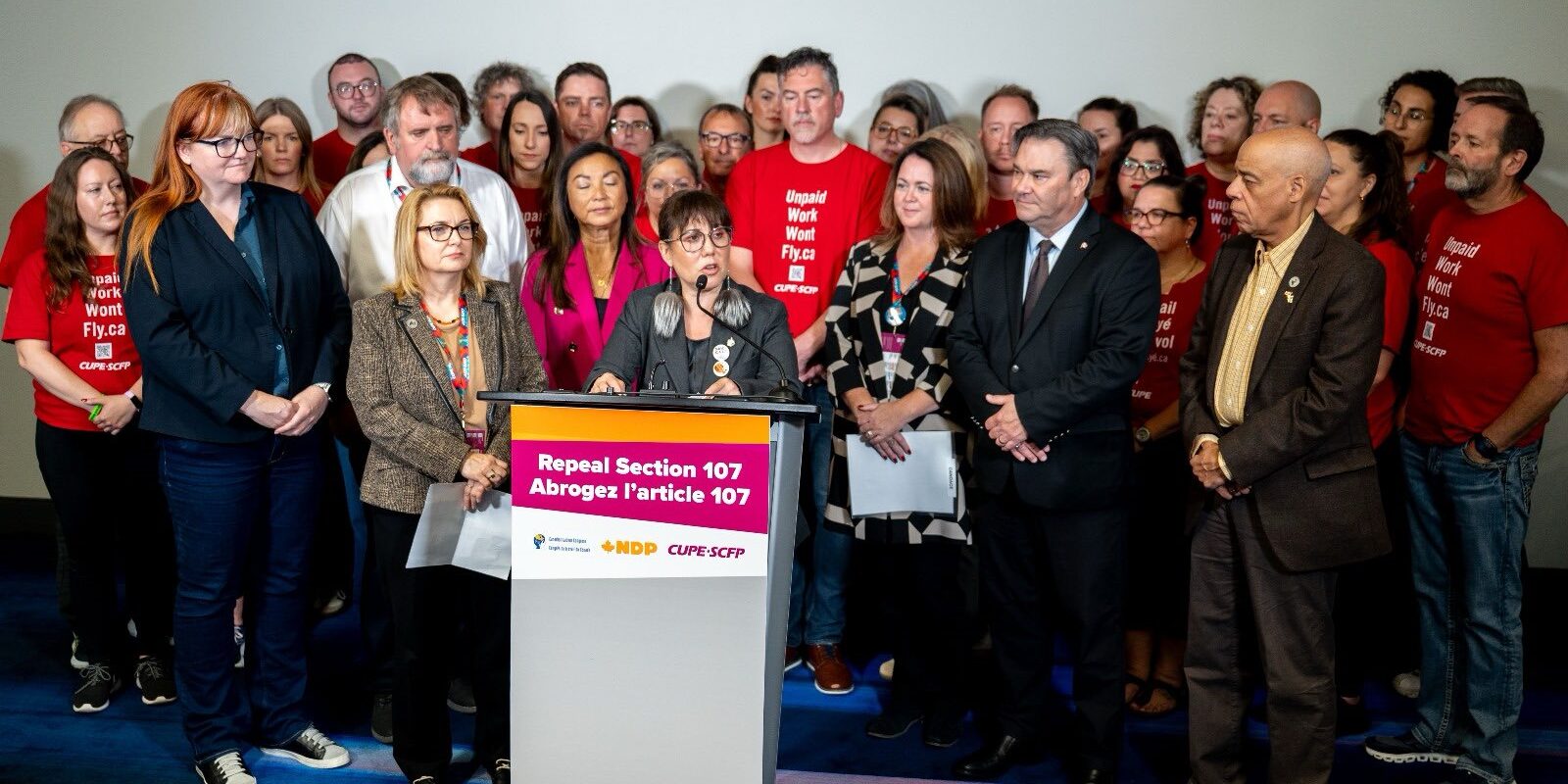Top Stories
NDP Unveils Urgent Bill to Repeal Controversial Labour Code Section

UPDATE: The New Democratic Party (NDP) has just tabled a critical bill aimed at repealing Section 107 of the Canada Labour Code, a move that could significantly impact workers’ rights across the nation. Introduced by NDP MP Leah Gazan on Monday, Bill C-247 is gaining momentum as labour leaders rally in support.
The urgency of this legislation cannot be overstated. Since June 2024, Section 107 has been invoked eight times by the federal government, enabling ministers to intervene in bargaining processes and halt strikes. This includes recent actions against postal workers, flight attendants, and railway employees, raising alarms over potential violations of workers’ rights to strike and engage in collective bargaining.
“We cannot allow big corporations to dictate the terms of workers’ rights,” Gazan stated emphatically while presenting the bill. “This is a direct violation of the rights we fought hard to secure. The government must stop interfering when it’s politically convenient.”
Labour leaders from the Canadian Labour Congress (CLC) and the Canadian Union of Public Employees (CUPE) are expressing strong support for this bill. CLC President Bea Bruske praised the NDP’s commitment to workers and emphasized that the organization will mobilize efforts to push this bill into law: “No government should ever strip workers of their right to fair bargaining. We will keep the pressure on this government.”
The ramifications of Section 107 have been particularly evident this summer when CUPE flight attendants faced immediate government intervention just hours after initiating a strike over unpaid work hours and stagnant wages. Despite a return-to-work order, many chose to remain on the picket line, illustrating the heightened tensions between workers and the government.
CUPE President Mark Hancock voiced his concerns, stating, “Collective bargaining works—but only when it’s allowed to. This government’s actions have already harmed workers’ livelihoods and their constitutional rights.” With negotiations still unresolved between CUPE and Air Canada, the call for change grows louder.
The impact of Section 107 extends beyond flight attendants. During a strike in November 2024, postal workers were similarly ordered back to work by then Labour Minister Steve MacKinnon. Almost a year later, negotiations between Canada Post and the postal workers union remain stalled, leading to another strike initiated in September following controversial changes to service delivery models.
Gazan declared, “The government must stop punishing workers exercising their Charter rights to strike for fair wages and safe working conditions. This anti-democratic measure goes beyond previous administrations’ anti-worker policies.”
With Bill C-247 now in the House of Commons, the path forward is uncertain, but the stakes for Canadian workers are undeniably high. As labour organizations and political figures rally support, the focus shifts to how Parliament will respond to this urgent matter and whether they will uphold the rights of workers.
Stay tuned for developments as this story unfolds. The future of workers’ rights in Canada hangs in the balance.
-

 World3 months ago
World3 months agoScientists Unearth Ancient Antarctic Ice to Unlock Climate Secrets
-

 Entertainment3 months ago
Entertainment3 months agoTrump and McCormick to Announce $70 Billion Energy Investments
-

 Science3 months ago
Science3 months agoFour Astronauts Return to Earth After International Space Station Mission
-

 Lifestyle3 months ago
Lifestyle3 months agoTransLink Launches Food Truck Program to Boost Revenue in Vancouver
-

 Technology2 months ago
Technology2 months agoApple Notes Enhances Functionality with Markdown Support in macOS 26
-

 Top Stories7 days ago
Top Stories7 days agoUrgent Update: Fatal Crash on Highway 99 Claims Life of Pitt Meadows Man
-

 Sports3 months ago
Sports3 months agoSearch Underway for Missing Hunter Amid Hokkaido Bear Emergency
-

 Politics2 months ago
Politics2 months agoUkrainian Tennis Star Elina Svitolina Faces Death Threats Online
-

 Technology3 months ago
Technology3 months agoFrosthaven Launches Early Access on July 31, 2025
-

 Politics3 months ago
Politics3 months agoCarney Engages First Nations Leaders at Development Law Summit
-

 Entertainment3 months ago
Entertainment3 months agoCalgary Theatre Troupe Revives Magic at Winnipeg Fringe Festival
-

 Politics1 week ago
Politics1 week agoShutdown Reflects Democratic Struggles Amid Economic Concerns




















